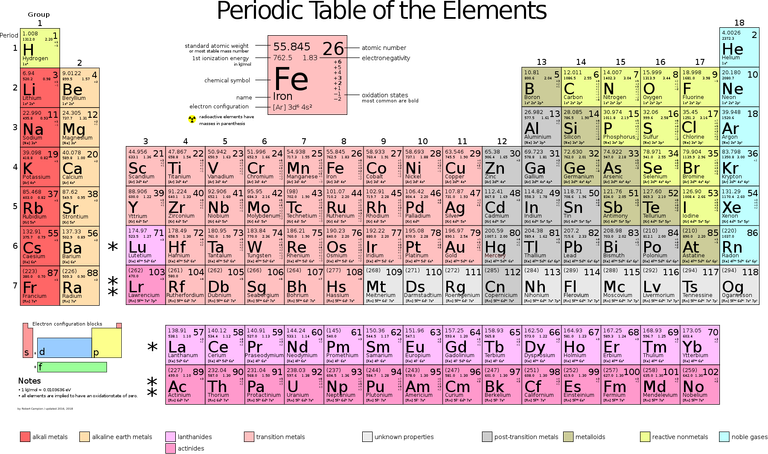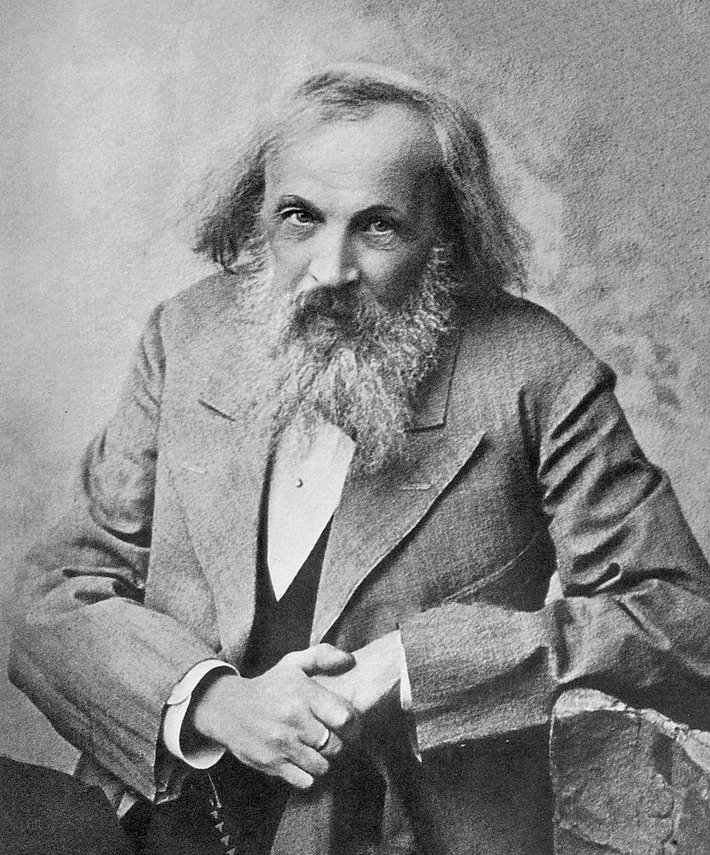Anyway, I prefer not to delve into a topic that I cannot remedy and that does not provide a good vibe to share. So I prefer to comment on an anniversary in #History, which has to do with an anniversary of a very interesting contribution to #Science, and more specifically to chemistry. Today is 'Periodic Table Day'.
+++
Como sea, prefiero no profundizar en un tema que no puedo remediar y que no aporta una buena vibra para compartir. Así que prefiero pasar a comentar sobre una efeméride de la #Historia, que tiene que ver con un aniversario de un aporte muy interesante para la #Ciencia, y más específicamente para la química. Hoy es el ‘Día de la Tabla Periódica’.
+++

Image's Source - Fuente de la Imagen
The Periodic Table is celebrated on this day, as it is the anniversary of its invention. It was on February 7, 1863, that the English chemist John Newlands published one of the first tables of elements. Although it was not one of the most popular things, he began a more detailed attempt to achieve a way to organize the classification of known chemical elements. Although it is not that it was actually the first attempt, since there were other previous ones, such as that of the famous French chemist Antoine-Laurent de Lavoisier, who in 1789 had addressed these topics in his book 'Elementary treatise on chemistry'.
+++
Se celebra en este día la Tabla periódica, por ser el aniversario de su invención. Fue el 7 de febrero de 1863, que el químico inglés John Newlands publicó una de las primeras tablas de elementos. Aunque no fue una de las cosas más populares, dio inicio a un intento más detallado por lograr una manera de organizar la clasificación de los elementos químicos conocidos. Aunque tampoco es que fuera en realidad el primer intento, pues hay otros anteriores, como el del insigne químico francés Antoine-Laurent de Lavoisier, que en 1789 había abordado estos temas en su libro ‘Tratado elemental de química’.
+++

Dmitri Mendeléyev
Image's Source - Fuente de la Imagen
The Russian I am talking about is Dmitri Ivanovich Mendeleev, a chemistry professor who published his proposed classification table of the elements in 1869. This table achieved greater dissemination and acceptance. Mendeleev was a professor with a reputation for being a little carefree, and he was also passionate about card games. He seems to have had trouble designing his own class notes, and he helped himself by creating a series of playing cards on which he recorded the known characteristics of the elements, such as atomic mass, electron shells, and other things. When finished, he noticed that he could arrange the cards he had created following the logic of a card game, Solitaire-style.
+++
El ruso del que hablo es Dmitri Ivánovich Mendeléyev, un profesor de química que publicó su propuesta de tabla de clasificación de los elementos en 1869. Esta tabla logró una mayor difusión y aceptación. Mendeléyev era un profesor con fama de ser un poco despreocupado, además de que era un apasionado por los juegos de cartas. Parece que tenía problemas para diseñar sus propias notas de clase, y se auxilió creando una serie de naipes en los que registró las características conocidas de los elementos, tales como la masa atómica, las capas de electrones, y otras cosas. Al terminar, notó que podría ordenar las cartas que había creado siguiendo la lógica de un juego de cartas, al estilo del Solitario.
+++

Image's Source - Fuente de la Imagen
At such moments, I imagine this Russian professor playing cards on his desk, while he was preparing for his classes. The image makes me think that, even though I read that he had a reputation for not being the best chemist or the best teacher in his family, it was he who left the family name tied to the history of science.
The post is already a bit long for me. I say goodbye, wishing you that you are well and that we can read again another time.
+++
En tales momentos, me imagino a este profesor ruso jugando cartas en su escritorio, mientras preparaba sus clases. La imagen me hace pensar que, a pesar de que leí que tenía fama de no ser el mejor químico o el mejor profesor de su familia, fue él el que dejó el apellido de la familia atado a la historia de la ciencia.
Ya me ha quedado un poco largo el post. Me despido, deseándote que tú estés bien y que nos podamos leer de nuevo en otra oportunidad.
+++
This challenge is an initiative of @flaxz
The 4 points to join the #IAmAliveChallenge, includes using the hashtag #alive to post to We Are Alive Tribe and earn ALIVE tokens.
Este desafío es iniciativa de @flaxz
Los 4 puntos para unirte al #IAmAliveChallenge, incluyen el uso de la etiqueta #alive para publicar en We Are Alive Tribe y ganar tokens ALIVE.



